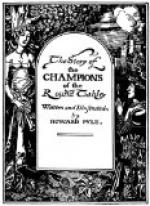Then Sir Launcelot said to them: “Where is your lord?” Whereunto they made reply: “Sir, he lieth in the dungeon of the castle under the ground chained to the walls thereof, and there he hath been for three years or more, and no one hath dared to bring him succor until you came hither.” “Go find him,” said Sir Launcelot, “and set him free, and lose no time in doing so. And put him at all ease that you can.”
[Sidenote: Sir Launcelot departs without refreshment] They say: “Will you not stay and see him, Messire, and receive his acknowledgements for what you have done?” But Sir Launcelot replied: “Nay, not so.” Then they say: “Will you not have some refreshment after this battle?” Whereunto Sir Launcelot said: “I do not need such refreshment.” Then they say: “But will you not rest a little?” “Nay,” said Sir Launcelot: “I may not tarry, for I have far to go and several things to do, so that I do not care to stay.” So he loosed his horse from the ring in the wall, and mounted upon it and rode away from that castle and from that town and across the bridge whence he had come. And all the people followed after him, giving him great acclaim.
So Sir Launcelot left the castle, not because he needed no rest, but because he could not endure to receive the thanks of those whom he benefited. For though he loved to bring aid to the needy, yet he did not love to receive their thanks and their praise. Wherefore, having freed the lord of that castle from that brood of giants, he was content therewith and went his way without resting or waiting for thanks.
For so it was with those noble gallant knights of those days; that whilst they would perform signal service for mankind, yet they were not pleased to receive thanks or reward for the same, but took the utmost satisfaction, not in what they gained by their acts, but in the doing of knightly deeds, for they found all their reward in their deeds, because that thereby they made the world in which they lived better; and because they made the glory of the King, whose servants they were, the more glorious.
And I hold that such behavior upon the part of anyone makes him the peer of Sir Launcelot or Sir Tristram or Sir Lamorack or Sir Percival; yea, of Sir Galahad himself. For it does not need either the accolade or the bath to cause a man to be a true knight of God’s making; nor does it need that a mortal King should lay sword upon shoulder to constitute a man the fellow of such knightly company as that whose history I am herewith writing; it needs only that he should prove himself at all times worthy in the performance of his duty, and that he shall not consider the hope of reward, or of praise of others in the performance of that duty.
So look to it that in all your services you take example of the noble Sir Launcelot of the Lake, and that you do your uttermost with might and main, and that you therewith rest content with having done your best, maugre any praise. So you shall become a worthy fellow of Sir Launcelot and of his fellows.




